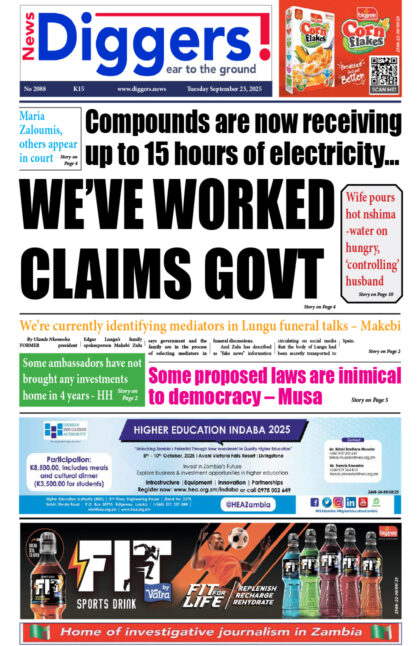Former General Secretary of the National Energy Sector and Allied Workers Union Yotam Mtayachalo says government should think ahead and develop other sources of energy that will ensure that Zambia still has electricity even without rains.
And Mtayachalo says the authority should also consider developing hydro power stations in the Northern region of Zambia where there’s enough rainfall.
Meanwhile, Mtayachalo says ZESCO should come up with best schedule options for the introduced load-shedding so that businesses are not negatively affected.
Last week, ZESCO said it was immediately commencing load-shedding in order manage the energy supply deficit which has been caused by a drop in water levels on Lake Kariba, Itezhi-tezhi and Kafue Gorge.
The power utility also invited the Economic Association of Zambia to a consultative meeting to discuss the implementation approach for load-shedding.
And in an interview with News Diggers! Mtayachalo said load shedding was expected because the rains in the last season were not enough.
“That is expected. If our dams don’t have enough volumes of water, ZESCO has no option but to ration power generation. Because if they are going to generate power at full capacity, it means that you create a much bigger crisis. Meaning that you are going to deplete the volumes of water. Its nature that we didn’t receive enough rains to fill our dams,” he said.
“It must be a lesson to us Zambians that in future, we must be able to plan well because most of our hydro power stations are in the Southern side. We have the Kariba North bank, Kafue Gorge, Victoria Falls, Itezhi-tezhi, they are all on the Southern part which is usually affected by drought. We must be looking at developing hydro power stations in the Northern region where we have abundant rainfall,” Mtayachalo said.
And Mtayachalo appealed to government to develop other sources of energy other than depending on hydro power.
He added that with global warming, the rainfall pattern would continue to be affected and would in turn affect power generation.
“We must also be looking at developing other sources of energy instead of depending only on hydro power because we don’t know [what can happen], we may not have rains for maybe, let’s say, five years. So we must be planning for such things. With this global warming, we expect that the rain pattern will continue to be affected, that will affect power generation. So we must be thinking ahead and ensure that we put in place measures that will ensure that even if we don’t have rains in a particular season, we still have enough electricity for our local consumption and also for export,” Mtayachalo said.
Meanwhile, Mtayachalo urged ZESCO to come up with best schedule options for the load-shedding so that businesses are kept running.
“At the moment, I don’t think importation of power, ZESCO is in that position, neither the government [because] it has no money to import power. Unless you say you will import power and resell it at an economic rate, which I think will be beyond the reach of many businesses. So for me, the best is for ZESCO to come up with best schedule options that will be implemented in such a way that [load shedding] doesn’t negatively affect business, especially the mining industry because its the backbone of the economy,” he said.
“Already the economy is very bad, so now if you are going to affect productivity because of reduced power generation, it has far reaching economic consequences. So I hope that ZESCO, government and other stakeholders will come together and find a better way to sort out this problem so that the economy is not negatively affected.”
He commended Zesco for comming up with a consultative meeting on load-shedding implementation.
“ZESCO has to consult its customers especially on the implementation of load-shedding. I think the reason why ZESCO is asking stakeholders, is that maybe the public may have very good suggestions, alternatives so that it can adjust its load-shedding schedule. Because if ZESCO just implements load shedding, they may not know that such a move could have threatening effects on the customers. (The stakeholder consultative meeting) is very important so that even when this load shedding is being implemented, at least the customers have an idea. That way you create less tension between ZESCO and its customers. To me, I think a consultative process is the best way to go,” said Mtayachalo.
























